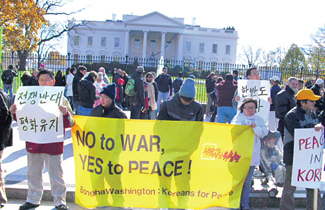–

WASHINGTON – On the coldest day of the season so far, on a traditional holiday weekend and with just one day’s notice, dozens of Korean-Americans joined members of the International ANSWER Coalition in front of the White House Nov. 27 to protest what they warned are U.S. efforts to provoke the resumption of a shooting war with North Korea.
Although hostilities between the two countries ended with an “armistice” in the 1950s, no peace treaty was ever signed and an official state of war continues, nearly six decades later.
“At 11 o’clock last night I saw the announcement from Richmond, Va., and I made my mind up that I was going to be here this morning,” Korean-American activist Sigmun Rhee told the cheering crowd. “It is that important that Americans and Korean-Americans–all peace loving people–come together to make sure that our nation stands for peace, not for war.
“That is the reason why it is encouraging to see this many people in one day, to show up, and it will grow as we move on with this movement. We will make ourselves assured that it is the responsibility as citizens of this nation to make sure that our own national policy and foreign policy be just, and fair, and right in order that this nation, together we may build,” Mr. Rhee continued.
“As Martin Luther King used to say and has said so many times: ‘We are here together that the oppressors and oppressed all be free in order to create a new society,’ that’s so all of us can live in peace and justly. This is the continuing struggle that we must carry on. Black and White and Yellow and everybody together, that we may see the righteousness of God in this nation,” he said.
The anti-war movement throughout the country is in a “demobilized state,” ANSWER Coalition coordinator Brian Becker told the crowd, which he said, is why it is important that so many people had come together to demonstrate their willingness to struggle against this nation’s war hawks. “Because if we don’t fight, we know that the war makers will win,” Mr. Becker said.
“The people are the real power, but only if they organize, only if they mobilize, only if they fight back. If we don’t fight back, then it looks like all the power is in the White House, and all the power is in the Pentagon, and all the power is with the war makers. So, what we’ve done today is extremely important,” he continued.
The Obama administration and its South Korean “client government led by the rabidly anti-communist President Kim Myung-bak are blaming the Democratic People’s Republic of Korea (North Korea) for the latest escalation of hostilities in the Korean Peninsula,” the ANSWER Coalition said in a statement.
“But in reality the crisis there is the result of a policy of deliberate provocation by the U.S. and South Korea over the past several months. These provocations are targeting both the DPRK and the People’s Republic of China, countries where the often-concealed but very real aim of U.S. leaders–Democrats and Republicans alike–is ‘regime change.’ They could also lead to a new Korean war, one that could expand to wider regional and potentially nuclear, conflict.”
The North Korean government wants direct talks with the United States, a formal peace treaty ending the Korean War, and a normalization of relations with the United States, the ANSWER Coalition insists. “This seemed like a realizable goal in the last months of the Bill Clinton administration in 1999 and 2000. George W. Bush scuttled these efforts shortly after taking office in 2001. The Obama administration continued this policy with new sanctions and endless war games simulating the invasion and bombing of North Korea.
“The anti-war movement and all progressive people and organizations should stand against any new war, and demand an end to the U.S.-South Korean provocations,” according to the ANSWER Coalition.
At Final Call presstime, the U.S. military was engaged in military exercises with South Korean forces after hostilities erupted between North Korea and South Korea. The U.S. condemned North Korea Nov. 29 for firing rockets into a South Korean island in the Yellow Sea, which killed two civilians, two soldiers, wounded 18 others and led some residents to flee.












